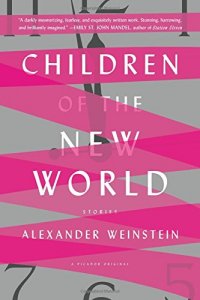Paul Di Filippo reviews Alexander Weinstein
Children of the New World, by Alexander Weinstein (Picador 978-1250098993, $16.00, 240pp, trade paperback) 13 September 2016
 Once some inspired writer conceived of the notion of writing a coherent “future history” in science fictional mode, then the corollary notion of visiting different points of that future history in a series of related but not directly sequential stories was also almost immediately born. And so we have the milestone volume by Heinlein, The Past Through Tomorrow. Since then, scores of such volumes have appeared, with some fairly recent standouts being Baxter’s Vacuum Diagrams and Matthew Derby’s Super Flat Times. I myself attempted such a collection with Ribofunk. And of course, the mode is popular as well among purely mimetic writers, going back at least as far as Winesburg, Ohio.
Once some inspired writer conceived of the notion of writing a coherent “future history” in science fictional mode, then the corollary notion of visiting different points of that future history in a series of related but not directly sequential stories was also almost immediately born. And so we have the milestone volume by Heinlein, The Past Through Tomorrow. Since then, scores of such volumes have appeared, with some fairly recent standouts being Baxter’s Vacuum Diagrams and Matthew Derby’s Super Flat Times. I myself attempted such a collection with Ribofunk. And of course, the mode is popular as well among purely mimetic writers, going back at least as far as Winesburg, Ohio.
With his debut volume, Children of the New World, Alexander Weinstein is the latest creator to venture down such a path, and a fine job he does. Coming from outside the genre precincts, he nonetheless exhibits an intimate familiarity and dexterity with all of SF’s toolkit, as well as the ability to insert some subtle homages to past landmarks of SF.
The stories play nicely off each other to illuminate an era-to-come that is pretty much a straight-line extrapolation of many current trends—most of them unfortunate. This book features no wild-card alien invasions or unforeseen plagues; no gigantic tipping points into a new Ice Age or Burning World (well, at least not till the final story); no world-ruling dictators or transformative geniuses. Instead, we get logical albeit still surprising extensions of artificial intelligence and genetic engineering, of new drugs and new recreational devices, of social media and fads, all slimed over with the anomie and existential dread that has plagued modern civilization for at least a century now.
Weinstein’s preference for first-person narrators induces a full sensory immersion in his world, but he also experiments formalistically in the manner of John Brunner using “multimedia” inserts in Stand on Zanzibar.
Our first story, “Saying Goodbye to Yang” harks to Brian Aldiss’s “Super-Toys Last All Summer Long,” as we witness a well-off selfish couple dealing with the “demise” of the robot companion for their human child. The litany of consumerism that afflicts the family and their lack of introspection is suitably damning. But as in the subsequent stories, Weinstein exhibits an ultimate compassion and empathy for his figures which render them pitiable, if not likable.
“The Cartographers” deals with memory implants, fake lives purchased by jaded “viewers.” “Corner-store memories [that] China’s producing—$8.99 porn thrills so poorly constructed that you can see the patches of light where the software burns through the girls’ skin.” Highly Gibsonian. “Heartland” involves a father commodifying his smart kid on a game show—and stopping short of further, more vile exploitation. “Excerpts from The New World Authorized Dictionary” is one of the more experimental entries, being just what it advertises, a selection of slang definitions that highlight some of the more perverse elements of this era.
In “Moksha” we journey to Nepal for some electronically induced enlightenment: “old and young alike…getting data shot through their crown chakras for five thousand rupees a pop.” Virtual and augmented realities play a large part in Weinstein’s vision, and in the title story we are faced with the emotional and ethical dilemma of having to delete some very special avatars. I should use this instance to mention that Weinstein focuses on the flyover parts of America, not the big cities, seeing our representative heroes in suburban and rural climes.
“Fall Line” deals with the plight of a famous winter-sports athlete when all the snow is gone. The acidic spirit of Stanislaw Lem hovers over the droll fake academic report titled “A Brief History of the Failed Revolution.” More family dynamics are explored in “Migration,” which, in its portrayal of individuals afraid to leave the safety of their home, instead existing in a Boschean VR simulation, conjures up thoughts of David Bunch’s Moderan without the manic glee.
Any story that features Tibetan Buddhist terrorists led by the Dalai Lama, as does “The Pyramid and the Ass,” is worthy of Tom Disch or Norman Spinrad. “It was Rocket Night at our daughter’s elementary school, the night when parents, students, and the administration gather to place the least liked child in a rocket and shoot him into the stars.” So begins “Rocket Night,” in its effective homage to Shirley Jackson’s “The Lottery.” “Openness” tests the feasibility of going off the grid in this Brave New World and trying to remember what unmediated humanity is all about. And finally, “Ice Age” depicts the inutile continuation of hyper-sophisticated behaviors and beliefs in a frozen-over world that is utterly antithetical to our petty concerns.
The future laid out by Weinstein is both a repudiation of our current way of living and a hopeful assertion that even in a hellish environment some small flowers of redemption can bloom. If you enjoyed George Saunders’s similar CivilWarLand in Bad Decline, you will certainly relish this slightly less surreal, less gonzo instantiation of the all-too-likely sentiment that this civilization and culture of ours is on a greased skid to absolute ethical and corporeal bankruptcy.





